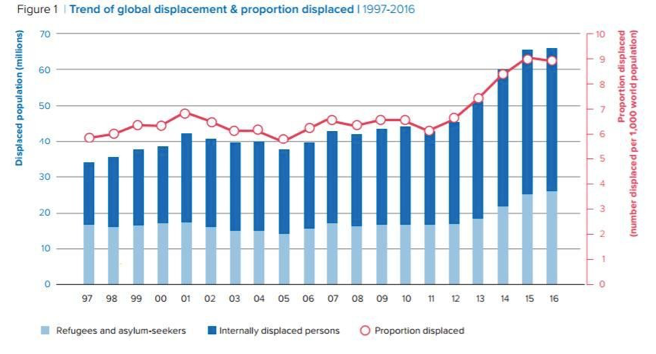How Can We Better Serve Refugees?
- Sabrina P.
- Mar 15, 2018
- 4 min read
Updated: Mar 26, 2018

Refugees are people who have fled their country from conflict or persecution (‘Refugees’, n.d.). In 2016, the number of refugees rose to 22.5 million globally (Edmond, 2017). Experiencing war, bombings, torture, poverty and resettlement among other things, may cause refugees to develop a myriad of mental health problems and trauma symptoms such as depression and post-traumatic stress disorder (PTSD) (Haadfield, Ungar & Ostrowski, 2017; Langlois, Haines, Tomson & Ghaffar, 2016). Refugees also often experience other health problems such as malnutrition and anemia, and non-communicable and infectious disease (Langlois et al., 2016).

There is an urgent need for the health sector to properly address the impact of migration on health and the health of refugees must be addressed in a comprehensive manner. Equally important is ensuring the protection of refugees, which includes safety from being returned to danger, access to fair and efficient asylum procedures, and measures to ensure that their basic human rights are respected while they secure a longer-term solution (‘Refugees’, n.d.).
Barriers to Accessing Healthcare Services
Refugees who come to Canada are moving to a country with a different culture, traditions, food, official languages, and laws (Haadfield, Ungar & Ostrowski, 2017). Moreover, they face many barriers that contribute to delayed and reduced care for health.
Some of these barriers include (Moris, Popper, Rodwell, Brodine & Brouwer, 2009):
Language and communication
Lack of transportation
Insurance and medical expenses
Cultural beliefs
Acculturation
Unfamiliarity with the health system
How Can Refugees Be Better Served?
Access to essential healthcare services for refugees is a fundamental right (Langlois et al. 2016). That said, efforts from cross-sector and interdisciplinary approaches that promote comfortable settlement and well-being, and access to education and healthcare services should be supported (Haadfield, Ungar & Ostrowski, 2017; Langlois et al., 2016).
Additionally, actions to minimize vulnerability to ill-health and to address the social determinants of health by promoting ability to access promotive, preventive and curative health services (Haadfield, Ungar & Ostrowski, 2017).
Some Actions at the Individual & Community Level:
Facilitating access to health care includes transportation, hours of service, wait time, appointment availability, scheduling, childcare needs and insurance coverage (Moris et al., 2009).
Healthcare staff must be trained to provide culturally safe and competent care that includes having knowledge about the culture, traditions and language (Moris et al., 2009). Trained staff can interact better with refugees, help explain diagnostic findings, medication, prescriptions, available options and understand concerns. Language services are especially essential to reducing communication and language barriers many refugees face within the healthcare system.
Reducing stress of acculturation by helping refugees adapt to the community where there are people from their country is also important. Communities can support refugees by loaning money to pay for medical costs and prescriptions and by serving as translators, providing emotional support and being a source of knowledge regarding how the healthcare system works (Moris et al., 2009).
Some Actions at the Global Level:
The World Health Organization (WHO) list actionable commitments in order to ensure safe, orderly and regular migration for refugees on a global level (‘Promoting health’, 2017). Some of which include:
Promote and monitor the health of refugees.
Promote refugee-sensitive health policies, legal and social protection and programme interventions that incorporate a public health approach which can provide equitable, affordable and acceptable access to essential health promotion, disease prevention, and health services.
Address the social determinants of health to ensure effective health responses and health protection in countries of origin, transit and destination.
Reduce mortality and morbidity among refugees through short and long-term public health interventions, aimed at saving lives and promoting the physical and mental health of refugees.
Protect and improve the health and well-being of women, children and adolescents living in refugee settings.

Refugees are usually resettled in countries where health resources are extensive, thus ensuring they are able to fully utilize the resources available to them upon resettlement should be of extreme importance to the government and healthcare providers. Being one of the most vulnerable populations, it is our goal to ensure barriers are addressed and broken down in order for refugees to have access to healthcare services.
Resource: The UN Refugee Agency
References:
Edmond, C. (2017, June 20). The number of displaced people in the world just hit a record
high. Retrieved March 20, 2018, from
https://www.weforum.org/agenda/2017/06/there-are-now-more-refugees-than-the-
entire-population-of-the-uk/
Hadfield, K., Ostrowski, A., & Ungar, M. (2017). What can we expect of the mental health and
well-being of Syrian refugee children and adolescents in Canada? Canadian
Psychology/Psychologie canadienne, 58(2), 194-201. https://doi:10.1037/cap0000102
Kay, M., Jackson, C., & Nicholson, C. (2010). Refugee health: a new model for delivering
primary health care. Australian Journal of Primary Health, 16(1), 98.
https://doi:10.1071/py09048
Langlois, E. V., Haines, A., Tomson, G., & Ghaffar, A. (2016). Refugees: towards better access
to health-care services. The Lancet, 387(10016), 319-321. https://doi:10.1016/s0140-
6736(16)00101-x
Morris, M. D., Popper, S. T., Rodwell, T. C., Brodine, S. K., & Brouwer, K. C. (2009). Healthcare
barriers of refugees post-resettlement. Journal of Community Health, 34(6), 529-538.
https://doi:10.1007/s10900-009-9175-3
Promoting the health of refugees and migrants: Framework of priorities and guiding principles
to promote the health of refugees and migrants. (2017). Retrieved March 20, 2018,
from http://www.who.int/migrants/about/framework_refugees-migrants.pdf
Refugees. (n.d.). Retrieved March 12, 2018, from http://www.unhcr.org/refugees.html




Comments